Iranian Police Commander Killed In Hit-And-Run
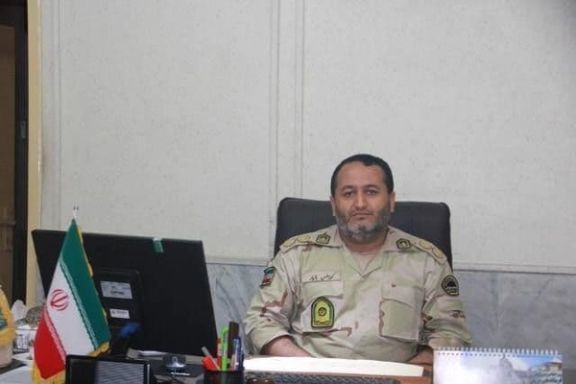
The commander of the Shiraz Police Rescue Unit, Colonel Kourosh Bazyar, was killed in a hit-and-run incident in the early hours of Tuesday.

The commander of the Shiraz Police Rescue Unit, Colonel Kourosh Bazyar, was killed in a hit-and-run incident in the early hours of Tuesday.
According to a statement released by the Fars Province Police Information Center, “Bazyar was on patrol when he encountered a pickup truck suspected of carrying suspicious cargo. He ordered the driver to halt, but the driver, disregarding the command, attempted to flee the scene.”
After a pursuit, law enforcement officers managed to disable the pickup truck by firing shots at its tires. However, during the subsequent inspection of the vehicle, a sedan Peugeot, which was accompanying the cargo, “deliberately collided with Colonel Bazyar at high speed, inflicting severe injuries.”
Despite immediate medical attention and being rushed to the hospital, Bazyar succumbed to his injuries.
While further details regarding the incident are yet to be disclosed, social media users have already begun circulating videos identifying the dead police commander as one of the key figures involved in suppressing the 2022 protests in Fars Province.
Rahambakhsh Habibi, the commander of law enforcement in Fars Province, announced the arrest of a suspect. Additionally, two accomplices aiding the suspect's escape were also apprehended, he claimed.
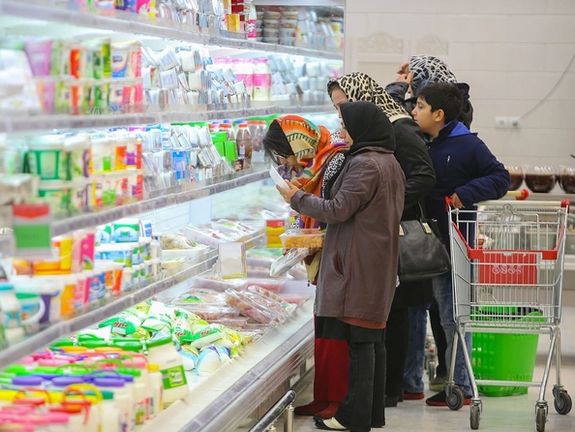
The rise in food prices in Iran have been accelerating in recent weeks with two big factors driving food price inflation higher, Ramadan and Nowruz, set to begin in March.
This year Ramadan starts on March 10 and the two-week holidays of Nowruz, which is the start of the Iranian New Year on March 20, lead to a significant increase in food prices, where most people celebrate both with numerous parties and religious events with food as the main glue of the gatherings. Studies have proven that the Muslim fasting month has a significant effect on the inflation of food prices in other countries where the Ramadan is observed, such as Turkey.
The anticipated increase in prices prompts the Islamic Republic to increase its hackneyed measures aimed at price control, including threats to shut down businesses or punitive measures for wholesale middlemen or retailers who do not comply with state-regulated rates. Other measures include supplying subsidized food items, distributing basic goods through state-owned chain stores, and banning exports.
However, these measures have minimal impact as mandated prices often do not correspond to the realities of the market and only lead to confusion and corruption by state companies who control the distribution networks of basic food items such as meat, edible oil, rice, flour, and sugar. Moreover, goods introduced by the government to stabilize the market are typically of low quality and quantity.
According to Iran’s statistics center, which releases a monthly price list of 53 food items among other indices, the general inflation rate in the last Iranian month, which ended December 20, was about 40 percent, in comparison with the same period last year. The prices of about 20 items on the list have increased more than the average inflation, with meat prices hitting over 130 percent.
The price of different kinds of meat or boneless mutton, as announced by official sources, is on average over 5,000,000 rials or about $10 per kilogram. Consumer prices at grocery shops are significantly higher, reaching as much as $20 per kilogram for high-quality products. Compared with an average monthly salary of about $150 to $200 in today’s exchange rates, wage earners cannot afford much meat.
Iran has been experiencing 40-percent inflation for at least three years, as its currency sinks and prices for imported essentials such as animal feed soar.
Last month, the governor-general of Kohgiluyeh and Boyer-Ahmad Province, where meat and chicken prices are higher than those in many other provinces, called for stricter enforcement of government-sanctioned rates. Ali Ahmadzadeh also urged regulatory bodies to prevent price hikes through constructive interaction with retailers and producers.
According to a report by Iran’s state news agency IRNA in November 2023, owners of butcher shops say prices are not reasonable, arguing for example that one kilogram of lamb meat imported from the neighboring Fars province costs about 4,500,000 rials (about $9) net and the government expects them to sell it at a lower price. If butcher shops fail to adhere to the government-approved rates, they not only risk closure but also incur fines.
In April 2018, as the United States was preparing to impose ‘maximum pressure’ sanctions, the rial fell to a then-record market low of around 60,000 against the dollar, the government of President Hassan Rouhani introduced a rate of 42,000 rials to the dollar to facilitate imports of essential goods. The government’s fixed-rate 42,000 rials for one dollar soon became a source of abuse by people who claimed to be importing essential goods, like food or raw materials, and instead imported luxury cars or simply turned around and sold the cheap dollars on the free market making huge profits.
The government began restricting the availability of dollars at 42,000 rials and President Ebrahim Raisi completely ceased the practice in 2022, saving around $15 billion annually, but accelerating food price inflation. The move immediately triggered a massive rise in prices for basic food staples, such as bread, dairy products, cooking oil and meat. In effect an important subsidy was removed, raising food, animal feed and medicine prices.
To compensate, President Raisi pledged to provide meat and chicken to the people at an "approved price" and even distributed special Ramadan handouts of 1.5 million rials (about $5) to 30 million citizens in 2022. The government has made numerous similar promises and announced numerous similar initiatives in the past.
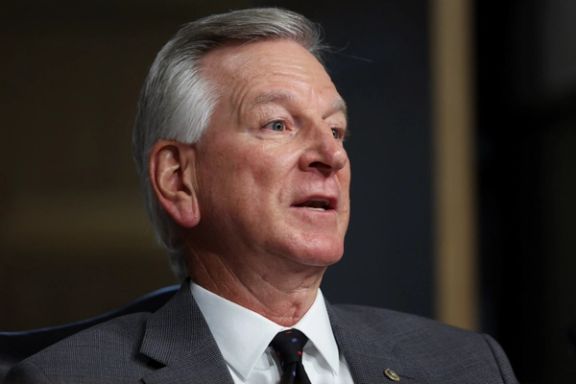
The US Senate Armed Services Committee has received no information from the Biden Administration regarding the impact of air strikes on Iran-linked targets, Sen. Tommy Tuberville told Iran International.
“I am on the Armed Services Committee, and we don’t know what we hit. We got no return summary of the bombing, and if anyone was hurt, anyone was killed, or anything was destroyed, and we spent a lot of money,” the Senator told our reporter Arash Alaei on Tuesday.
After a drone attack on January 28 on a US base in Jordan where three soldiers were killed, President Joe Biden pledged to retaliate, declaring that the attack was linked to Iran. However, the administration waited more than five full days before responding by air strikes on bases in Iraq and Syria, giving ample warning to Iranian IRGC and its proxies.
Critics have insisted that relentless attacks by Iran-backed forces against US targets in the region since mid-October warrants a more direct response against Iranian targets to re-establish deterrence. Reportedly, more ammunition was dropped than the number of armed individuals killed at the bombed locations.
Sen. Tuberville (R-AL) also expressed concern that the conflict in the Middle East is spreading because “others are getting involved” and not allowing the United States to calm the situation. He also expressed doubt that US retaliation against Iran-backed Houthi group, who attack vessels in the Red Sea, will have much of an impact
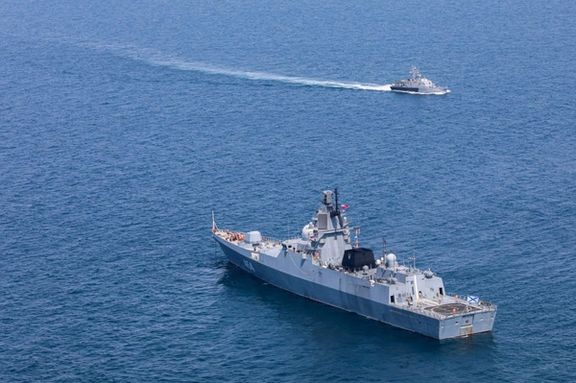
Iran, China and Russia will conduct a joint naval exercise in the coming weeks under what the trio claims aims at "ensuring regional security."
The commander of Iran's Navy, Shahram Irani, announced that other countries have also been invited to participate, although did not specify beyond China and Russia.
Irani emphasized that “the primary strategy of the Iranian Army Navy in the current situation is to safeguard the interests and economic resources of the Islamic system and its people,” referring to growing tensions in the Middle East sparked by Iran-backed militia Hamas's invasion of Israel on October 7.
In the wake of Israel's retaliatory attacks, Iran's proxies came out in allegiance, triggering a simmering regional conflict. US bases have been targeted over 160 times across the region as punishment for supporting Israel's right to defend itself.
Last year the three pariah states conducted a joint naval maneuver in the Gulf of Oman as they become a growing threat to the wider global landscape.
This week, the think tank Policy Exchange revealed that the UK faces "a back-door threat from the growing Iranian, Russian and Chinese presence in the Republic of Ireland, a mounting challenge for a chronically deficient Irish security and intelligence apparatus".
The threat from the anti-Western trio, experts warned, requires the UK to expand its air and naval presence in Northern Ireland, to counter a growing threat.
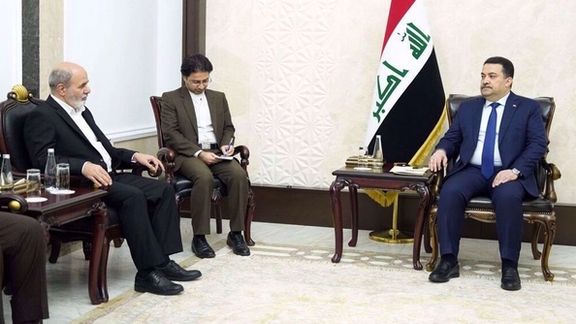
Amid tensions fueled by Iran's proxies in the region, Ali Akbar Ahmadian, the Secretary of Iran's Supreme National Security Council, met the Iraqi Prime Minister in Baghdad.
Iraqi National Security Council chief Qassem al-Araji was with Prime Minister Mohamed Shia al-Sudani in the discussions regarding the escalating tensions in the region.
"Iraq has deployed, and continues to deploy, important efforts towards preserving stability and establishing de-escalation, in the interests of all the people of the region," Sudani said, according to a statement from his office.
The meeting occurred against the backdrop of recent US airstrikes in Syria and Iraq targeting elite Iranian forces and pro-Tehran armed groups. The strikes were a response to a drone attack on January 28 that resulted in the deaths of three US soldiers at a base near the Syrian border in Jordan and over 160 attacks since the Gaza war broke out on October 7.
Iran's proxies have come out in allegiance with Iran-backed Hamas, which waged war on Israel in an invasion which was the most deadly single day for Jews since the Holocaust. The US has come under fire for its support of Israel's right to defend itself.
The US airstrikes in Iraq, close to the Syrian border, resulted in the deaths of 16 fighters from Hashed al-Shaabi, a coalition predominantly comprising pro-Iran paramilitary groups now integrated into Iraq's regular security forces.
Iran, a significant trade partner of Iraq, holds substantial political sway in Baghdad, with its Iraqi allies holding considerable influence in parliament and forming the current government.
After a meeting with Secretary of State Antony Blinken in November, Al-Sudani pledged to pursue the perpetrators of the rocket attacks on US bases in Iraq. The day after their meeting, the PM visited Tehran to meet President Ebrahim Raisi, Iraq in the middle of two allies amid wider regional conflict.

A prominent sociologist in Tehran says Iranians have lost faith in the left and right wings of the Islamic regime, but despite the disillusionment, the collapse of the system is unlikely.
Taghi Azad Armaki, a Tehran University academic argued in an interview that “the Iranian society has made a decision to disengage from the country's political system, preferring to pursue their own paths. Armaki argued that activists should not wait for the system's collapse or a potential war.”
Armaki pointed out that the new generation of Iranians primarily seeks a simple and peaceful life, devoid of political entanglements. He noted the widespread apathy towards political developments, including the upcoming elections in Iran, as people from various backgrounds and political affiliations have tirelessly strived for change over the past century, only to become disillusioned with politicians. The younger generation, in particular, tends to disregard political matters and the government altogether.
He clarified, "It is not that the Iranian society is indifferent. The issue is that the people want nothing to do with the government. Armaki attributed this disillusionment to various factors, including the perceived absurdity of elections, such as the Assembly of Experts election, where President Ebrahim Raisi is the sole candidate for his constituency and can secure a seat with just his own vote.

Reformist journalist and political activist Ahmad Zeidabadi echoed these sentiments, questioning the legitimacy of elections where a candidate can be elected with a single vote they cast themselves. "When Ebrahim Raisi can be elected to the Assembly of Experts with only one vote to represent the Southern Khorasan Province, based on what definition this can be called an election?” Zeidabadi emphasized the financial burden of such elections on the people and the futility of holding elections when the ultimate decision-making power remains outside the public's reach.
Armaki also noted that his generation was willing to take up arms against the political system before the 1979 revolution, whereas the Generation Z participants in the nationwide protests of 2022 did not entertain the idea of armed struggle.
He further highlighted that previous high voter turnouts had created an illusion of popularity among government insiders. However, recent elections with significantly lower turnout rates indicate that voters are not supporting specific candidates or political groups but seeking substantial change.
Armaki, like other academics such as Mohammad Ghasim Osmani, emphasized the growing disconnect between the Iranian people and the government. While the society still exists, it has disengaged from the government, reflecting a sense of hopelessness rather than despair. The government, on the other hand, has isolated itself within its own circles.
Referring to the current government, Armaki said: "Raisi has gathered a group of illiterate youngsters around himself. It is good to have young officials, but these officials should be able to bring about change.”
Armaki also commented on the situation of female lawmakers in the Iranian parliament, noting that they may appear as women, but often express views aligned with hardliner male counterparts. He questioned the government's emphasis on encouraging more children when it comes at a high cost. Additionally, he lamented the sight of young Iranians unable to care for their elderly relatives due to financial constraints.
Some other Iranian academics have taken a more radical stance on the situation in Iran. Bijan Abdolkarimi has even declared the Islamic revolution dead. He has criticized the government for attempting to address modern problems with outdated seminary knowledge and for lacking an understanding of freedom, leading to a dangerous widening gap between the people and the government.